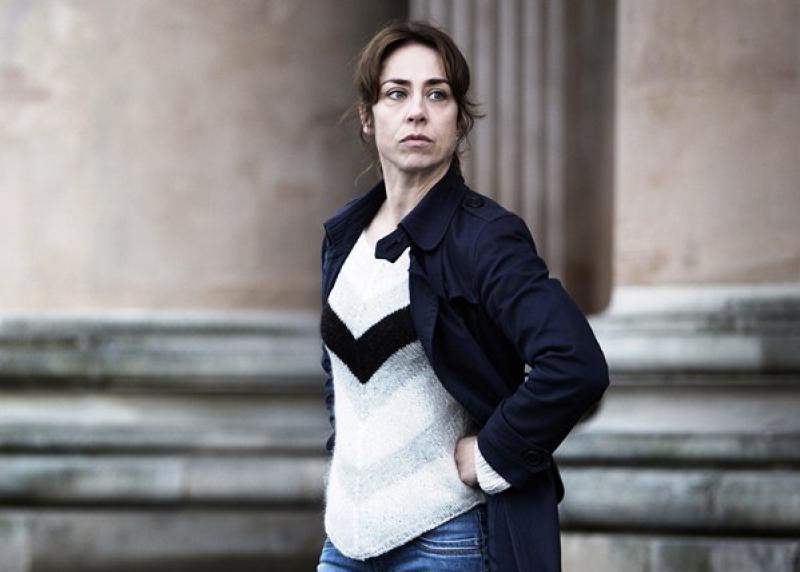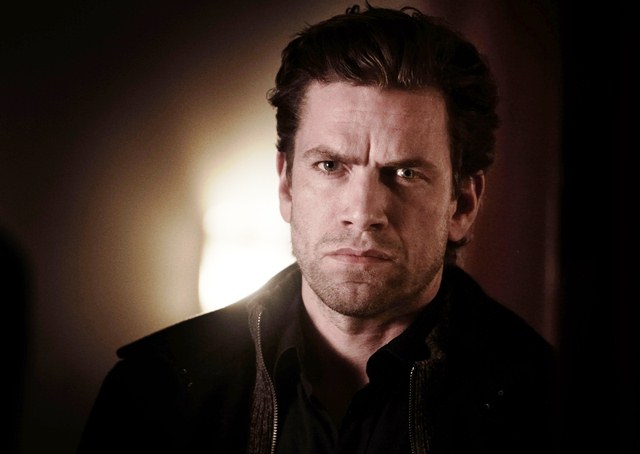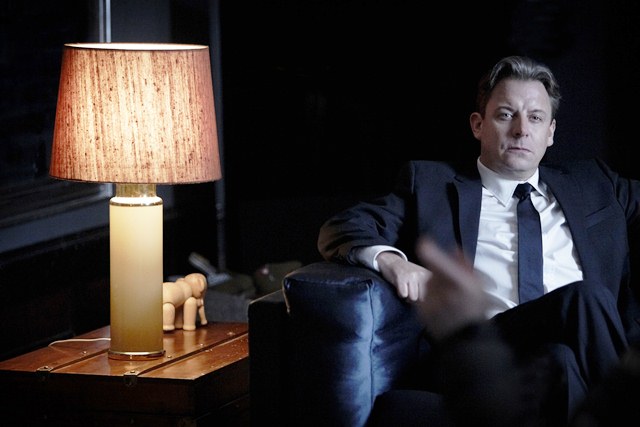The Killing III, BBC Four | reviews, news & interviews
The Killing III, BBC Four
The Killing III, BBC Four
Third series of Denmark's greatest TV export sets itself up to be more compelling than its predecessor

Zipping her trousers while coming out of a toilet cubicle, Sarah Lund continues the phone conversation that was on-going while she was in there. Making for a sink to wash her hands, she ignores the puppyish man trying to attract her attention. Nothing is going to distract Chief Inspector Lund, whether it’s the call of nature or the new police kid on the block.
The third and final series of The Killing doesn’t begin exactly like the second, with Sofie Gråbøl’s Lund marking time checking what comes off ships arriving in Denmark. Instead, we find her in another sort of holding pattern. On her 25th anniversary in the police, she’s looking forward to working for Operative, Planning and Analysis, a comfy chair-bound posting in a department considered a joke by the rest of the force.
 Preoccupied with her favoured path, Lund doesn’t engage with the body parts littering a scrapyard on Copenhagen’s dock side. A wheelbarrow there, which she fancies buying, is more interesting. Earnest new boy Asbjørn Juncker (Sigurd Holmen Le Dous) senses this is more than the random murder of a homeless person. She’s not fussed. The involvement of Special Branch operative Mathias Borch (Nikolaj Lie Kaas) (pictured right, photo by Tine Harden) – brought in as the docks were a stop-off for the campaigning Prime Minister – doesn’t divert her either. Soon, a photo of a tattooed, dismembered arm draws her in, even though she’s at home having a difficult phone conversation with her son. Lund won’t be heading for stats and charts.
Preoccupied with her favoured path, Lund doesn’t engage with the body parts littering a scrapyard on Copenhagen’s dock side. A wheelbarrow there, which she fancies buying, is more interesting. Earnest new boy Asbjørn Juncker (Sigurd Holmen Le Dous) senses this is more than the random murder of a homeless person. She’s not fussed. The involvement of Special Branch operative Mathias Borch (Nikolaj Lie Kaas) (pictured right, photo by Tine Harden) – brought in as the docks were a stop-off for the campaigning Prime Minister – doesn’t divert her either. Soon, a photo of a tattooed, dismembered arm draws her in, even though she’s at home having a difficult phone conversation with her son. Lund won’t be heading for stats and charts.
The UK premiere of The Killing III is a major distraction. One that might even turn Lund’s head. Even if the nitty-gritty of the 30 episodes of the first two series aren’t familiar, she has become instantly recognisable. Although not quite on the same level, The Killing and its fellow DR (Denmark's national broadcaster) production Borgen have also achieved the unlikely by making Denmark’s complex coalition politics familiar. Lund and her boss, Morten Suurballe's Lurch-like Lennart Brix, are the only characters retained from previous series. Otherwise, there's a raft of new faces to get to grips with.
Despite that, The Killing's universality makes it instantly compelling. The stories are grim, with unflinching depictions of victims, squalor and people knocked off balance, but it’s the finely drawn characters and their personal lives which resonate so much. Lund’s reaction to being told by her mother that her son does not want to see her is heart-stopping. Lonely, she rings up Borch in the dead of the night. He’s brisk, but they were at college together and have a past which will no doubt be revealed as the series unfolds.
 As ever, nothing is simple in Lund-world and nothing in The Killing exists in isolation. The dockside discovery leads into the hot topic of whether recession-hit Denmark's largest company, Zeeland, is going to relocate to Asia. In the run-up to an election the Prime Minister, Kristian Kamper (Olaf Johannessen) is juggling how to deal with Zeeland, the other parties and his love for the leader of the Centre Party who he has to strike deals with. Zeeland is run by the detached Robert Zeuthen (Anders W Berthelsen) (pictured left, photo by Tina Hager), who is recently divorced and fighting a mutinous board. His daughter is kidnapped. The crimes are linked to a ship owned by his company. Brix warns Lund that Zeuthen and Zeeland rank with royalty. Everything in this case will be subject to pressure. Following a lead, Lund quizzes a prosecutor. At the shocking end of last night’s second episode, he’s dead, hanged by the murderer-kidnapper, whose motives are still unclear. What’s next will be labyrinthine.
As ever, nothing is simple in Lund-world and nothing in The Killing exists in isolation. The dockside discovery leads into the hot topic of whether recession-hit Denmark's largest company, Zeeland, is going to relocate to Asia. In the run-up to an election the Prime Minister, Kristian Kamper (Olaf Johannessen) is juggling how to deal with Zeeland, the other parties and his love for the leader of the Centre Party who he has to strike deals with. Zeeland is run by the detached Robert Zeuthen (Anders W Berthelsen) (pictured left, photo by Tina Hager), who is recently divorced and fighting a mutinous board. His daughter is kidnapped. The crimes are linked to a ship owned by his company. Brix warns Lund that Zeuthen and Zeeland rank with royalty. Everything in this case will be subject to pressure. Following a lead, Lund quizzes a prosecutor. At the shocking end of last night’s second episode, he’s dead, hanged by the murderer-kidnapper, whose motives are still unclear. What’s next will be labyrinthine.
The mix of the personal, political (the business world is introduced to The Killing for the first time here) and their relations to social issues has become familiar in these Danish productions, but it remains fresh. Arcing the story over a whole series makes it addictive. The Killing could never be a film as it’s about the lengthy trajectory.
Based on these first two episodes, The Killing III looks more compelling, more assured than its predecessor, where the military backdrop was a little forced - although the presence of children (as it was with Borgen) feels like a plot device. The pulling of an awkward rabbit-out-of-the-hat on a live TV debate to undermine a political opponent also echoes Borgen, and there are hints that the perpetrator in The Killing III might be cut from the same twisted ideological cloth as The Bridge's truth-teller.
Perhaps, when the series concludes, Lund will find the peace she sought at the beginning. Before that can happen, with eight more episodes to come, she won’t be relaxing. Nor will anyone coming along for the ride.
The future of Arts Journalism
You can stop theartsdesk.com closing!
We urgently need financing to survive. Our fundraising drive has thus far raised £33,000 but we need to reach £100,000 or we will be forced to close. Please contribute here: https://gofund.me/c3f6033d
And if you can forward this information to anyone who might assist, we’d be grateful.

Subscribe to theartsdesk.com
Thank you for continuing to read our work on theartsdesk.com. For unlimited access to every article in its entirety, including our archive of more than 15,000 pieces, we're asking for £5 per month or £40 per year. We feel it's a very good deal, and hope you do too.
To take a subscription now simply click here.
And if you're looking for that extra gift for a friend or family member, why not treat them to a theartsdesk.com gift subscription?
more TV
 Your Friends & Neighbors, Apple TV+ review - in every dream home a heartache
Jon Hamm finds his best role since 'Mad Men'
Your Friends & Neighbors, Apple TV+ review - in every dream home a heartache
Jon Hamm finds his best role since 'Mad Men'
 MobLand, Paramount+ review - more guns, goons and gangsters from Guy Ritchie
High-powered cast impersonates the larcenous Harrigan dynasty
MobLand, Paramount+ review - more guns, goons and gangsters from Guy Ritchie
High-powered cast impersonates the larcenous Harrigan dynasty
 This City is Ours, BBC One review - civil war rocks family cocaine racket
Terrific cast powers Stephen Butchard's Liverpool drug-ring saga
This City is Ours, BBC One review - civil war rocks family cocaine racket
Terrific cast powers Stephen Butchard's Liverpool drug-ring saga
 The Potato Lab, Netflix review - a K-drama with heart and wit
Love among Korean potato-researchers is surprisingly funny and ideal for Janeites
The Potato Lab, Netflix review - a K-drama with heart and wit
Love among Korean potato-researchers is surprisingly funny and ideal for Janeites
 Adolescence, Netflix review - Stephen Graham battles the phantom menace of the internet
How antisocial networks lead to real-life tragedy
Adolescence, Netflix review - Stephen Graham battles the phantom menace of the internet
How antisocial networks lead to real-life tragedy
 Drive to Survive, Season 7, Netflix review - speed, scandal and skulduggery in the pitlane
The F1 documentary series is back on the pace
Drive to Survive, Season 7, Netflix review - speed, scandal and skulduggery in the pitlane
The F1 documentary series is back on the pace
 A Cruel Love: The Ruth Ellis Story, ITV1 review - powerful dramatisation of the 1955 case that shocked the public
Lucy Boynton excels as the last woman to be executed in Britain
A Cruel Love: The Ruth Ellis Story, ITV1 review - powerful dramatisation of the 1955 case that shocked the public
Lucy Boynton excels as the last woman to be executed in Britain
 Towards Zero, BBC One review - more entertaining parlour game than crime thriller
The latest Agatha Christie adaptation is well cast and lavishly done but a tad too sedate
Towards Zero, BBC One review - more entertaining parlour game than crime thriller
The latest Agatha Christie adaptation is well cast and lavishly done but a tad too sedate
 Bergerac, U&Drama review - the Jersey 'tec is born again after 34 years
Damien Molony boldly follows in the hallowed footsteps of John Nettles
Bergerac, U&Drama review - the Jersey 'tec is born again after 34 years
Damien Molony boldly follows in the hallowed footsteps of John Nettles
 A Thousand Blows, Disney+ review - Peaky Blinders comes to Ripper Street?
The prolific Steven Knight takes us back to a squalid Victorian London
A Thousand Blows, Disney+ review - Peaky Blinders comes to Ripper Street?
The prolific Steven Knight takes us back to a squalid Victorian London
 Zero Day, Netflix review - can ex-President Robert De Niro save the Land of the Free?
Panic and paranoia run amok as cyber-hackers wreak havoc
Zero Day, Netflix review - can ex-President Robert De Niro save the Land of the Free?
Panic and paranoia run amok as cyber-hackers wreak havoc
 The White Lotus, Series 3, Sky Atlantic review - hit formula with few surprises but a new bewitching soundtrack
Thailand hosts the latest bout of Mike White's satirical takedown of the rich and privileged
The White Lotus, Series 3, Sky Atlantic review - hit formula with few surprises but a new bewitching soundtrack
Thailand hosts the latest bout of Mike White's satirical takedown of the rich and privileged

Add comment